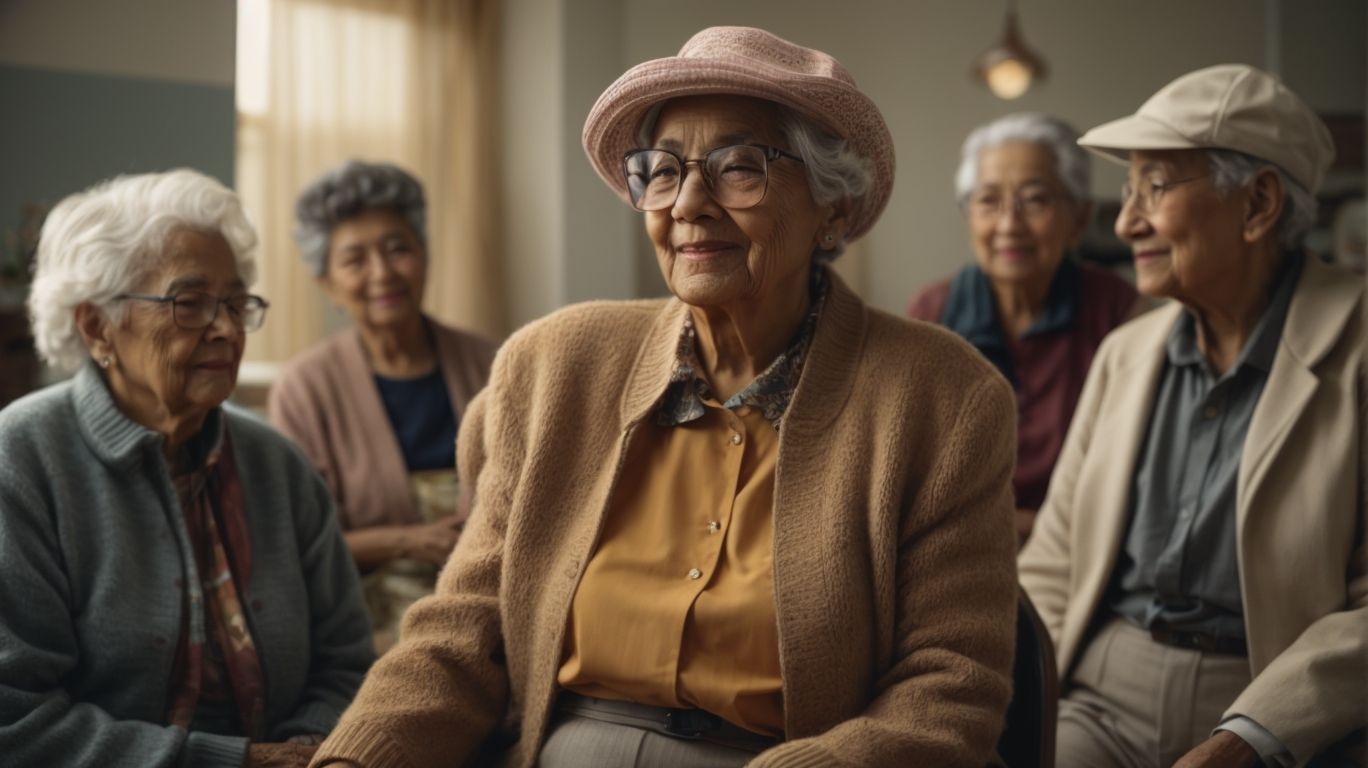As we age, our psychological well-being undergoes significant changes that can impact our memory, emotions, cognition, and social interactions. In this article, we will explore the field of old age psychology, delving into the transformations that occur in our mental processes as we grow older.
From examining the factors that influence old age psychology to discussing common mental health issues in older adults, we will also provide practical tips on how we can support the mental health of our elderly population.
Contents
- 1 What Is Old Age Psychology?
- 2 What Are The Changes In Psychology During Old Age?
- 3 What Are The Factors That Influence Old Age Psychology?
- 4 What Are The Common Mental Health Issues In Old Age?
- 5 How Can We Support The Mental Health Of Older Adults?
- 6 Frequently Asked Questions
- 6.1 What is old age psychology?
- 6.2 Why is it important to understand old age psychology?
- 6.3 How does old age psychology differ from other branches of psychology?
- 6.4 What are some common issues addressed in old age psychology?
- 6.5 What are some strategies for promoting mental well-being in old age?
- 6.6 How can understanding old age psychology benefit society as a whole?
What Is Old Age Psychology?
Old Age Psychology, also known as geropsychology, is the scientific study of psychological processes related to aging, encompassing the exploration of cognitive abilities, personality traits, and behavioral changes in individuals as they progress through the lifespan.
As individuals advance in age, their cognitive functions can undergo various changes, including alterations in memory, problem-solving skills, and decision-making processes. Researchers in the field of Old Age Psychology focus on understanding how these cognitive changes occur and how they impact an individual’s daily life. Studies in this area explore how different perceptual mechanisms evolve with age, affecting an individual’s interaction with the environment and social surroundings.
What Are The Changes In Psychology During Old Age?
The field of Old Age Psychology explores the multifaceted changes that occur in psychological domains during the aging process, encompassing cognitive decline, alterations in social interactions, shifts in behavior, and variations in subjective perceptions of one’s own aging.
One of the key cognitive changes that individuals may experience in old age is a decline in memory retention and processing speed, affecting their ability to learn new information or recall past events.
Older adults often undergo shifts in social dynamics, with changes in friendship circles, family relationships, and community engagement, leading to potential feelings of loneliness and isolation.
Behavioral adaptations in old age can include increased reliance on routines, coping mechanisms for physical limitations, and adjustments in lifestyle to accommodate changing abilities.
Subjective perceptions of aging can vary widely, with some individuals embracing the wisdom and experience that comes with age, while others may struggle with feelings of irrelevance or loss of identity.
How Does Memory Change In Old Age?
Memory function undergoes significant changes in old age, with cognitive decline impacting various aspects of memory retention, retrieval, and encoding processes.
As individuals age, they may experience difficulties in forming new memories, known as encoding, leading to challenges in creating long-term memories. Retrieval of stored information may become slower and less accurate due to weakened connections between neurons in the brain. These changes in memory processes are often attributed to alterations in cognitive function, such as decreased processing speed, attention, and working memory capacity. Psychological factors, including stress, anxiety, and depression, can further affect memory performance in older adults.
What Are The Emotional Changes In Old Age?
Emotional changes in old age encompass shifts in mood regulation, coping mechanisms, and overall emotional well-being, often influenced by cognitive abilities, personality traits, and mental health status.
As individuals age, they may experience a range of emotional fluctuations that can impact their daily lives.
Emotional regulation
becomes crucial during this phase, as older adults may find it challenging to manage intense feelings such as anxiety, loneliness, or sadness.
Coping strategies
play a significant role in helping navigate these emotional changes, with activities like mindfulness, social support, and engaging in hobbies aiding in maintaining a sense of balance.
The impact of mental health and personality on emotional well-being cannot be underestimated, as pre-existing conditions or personality characteristics may magnify the emotional responses during aging.”
What Are The Cognitive Changes In Old Age?
Cognitive changes in old age involve alterations in cognitive abilities such as memory, attention, and reasoning, influenced by various psychological processes and factors affecting cognitive health.
Psychological factors like stress and anxiety can contribute to cognitive decline by impacting memory and attention in older individuals. Research suggests that maintaining social engagement, physical exercise, and a healthy diet can help mitigate cognitive decline with age. As individuals grow older, they may experience shifts in their cognitive strategies, adapting to changes in cognitive functions such as problem-solving and decision-making. Understanding these cognitive transformations can lead to tailored interventions and strategies to promote cognitive health and well-being in aging populations.
What Are The Social Changes In Old Age?
Social changes in old age involve shifts in social roles, relationship dynamics, and behavioral patterns, influenced by various social factors and the evolving nature of social interactions.
As individuals progress through the lifecycle, their social roles often transform, bringing new challenges and opportunities for connection with others.
Social relationships in later years tend to become more selective, with a focus on close family and friends rather than broader social circles. This shift is partly due to changes in health, mobility, and living arrangements, which can impact the frequency and nature of social interactions. Older adults may experience modifications in their behaviors driven by a desire for social connection and fulfillment.
What Are The Factors That Influence Old Age Psychology?
Old Age Psychology is influenced by a complex interplay of biological, environmental, and social factors that impact aging processes, psychological well-being, and behavioral adaptations in older individuals.
Biological factors encompass genetic predispositions, health conditions, and physical changes associated with aging, all of which contribute significantly to the trajectory of old age psychology.
On the other hand, environmental influences such as living conditions, access to healthcare, and lifestyle choices also play a crucial role in shaping the mental and emotional well-being of older adults.
Social factors like relationships, social support networks, and societal attitudes towards aging can profoundly affect an individual’s sense of identity, mental health, and overall quality of life during their later years.
Biological Factors
Biological factors play a crucial role in shaping Old Age Psychology, with biomarkers, cognitive function assessments, and neuroimaging studies providing insights into the physiological underpinnings of aging processes.
One of the key aspects influenced by biological factors in elderly individuals is the presence of various biomarkers. These biomarkers, such as specific proteins or genetic markers, can indicate the status of physiological functions and potential health risks associated with advanced age.
Cognitive function assessments offer a valuable tool to understand how aging affects mental processes. These assessments often measure memory, attention, and problem-solving abilities, aiding in the evaluation of cognitive decline or cognitive resilience in older adults.
Neuroimaging techniques, including MRI and PET scans, allow researchers to visualize brain structures and activities, offering valuable insights into the neural mechanisms related to aging and cognitive changes. By integrating these approaches, researchers can gain a comprehensive understanding of how biological factors impact psychological processes in older individuals.
Environmental Factors
Environmental factors such as social relationships, lifestyle choices, and preventive health behaviors significantly influence Old Age Psychology, shaping cognitive health, emotional well-being, and overall quality of life in older adults.
When older individuals maintain strong social ties, it can lead to lower levels of stress, depression, and anxiety, thus positively impacting their mental health.
Engaging in regular physical activity and healthy eating habits as lifestyle choices not only boosts physical well-being but also enhances cognitive functions.
Practicing preventive health behaviors like routine check-ups and health screenings aids in early detection of potential issues, promoting proactive management and a better quality of life in their later years.
These combined factors create a holistic approach to nurturing mental, emotional, and physical well-being in older adults.
Social Factors
Social factors play a pivotal role in influencing Old Age Psychology, affecting mental health outcomes, social network dynamics, behavior modification, and personality traits in older individuals.
As individuals age, they are often subjected to various social influences that can significantly impact their psychological well-being. Understanding the interplay between social interactions and mental health is crucial in addressing the unique needs of older adults. Older individuals tend to rely heavily on their social network for emotional support, companionship, and a sense of belonging, making the quality of these relationships imperative for their overall mental health.
Social factors can also lead to behavior modification in older adults, influencing how they engage with others, adapt to new situations, and cope with challenges. The changes in their social environment and the support they receive can contribute to shifts in their behavior patterns.
What Are The Common Mental Health Issues In Old Age?
Old age is often associated with various mental health issues, including dementia, Alzheimer’s disease, personality changes, and challenges related to substance abuse and addiction.
These mental health challenges can significantly impact the quality of life for older individuals, as well as their families and caregivers. Dementia and Alzheimer’s disease, in particular, are neurodegenerative conditions that can lead to memory loss, cognitive decline, and behavioral changes. Personality alterations, such as mood swings, aggression, or apathy, are common in individuals with these conditions. The misuse of substances like alcohol or prescription drugs can exacerbate mental health issues and complicate medical management in the elderly population. Addressing these challenges requires a multidisciplinary approach involving healthcare professionals, family support, and community resources.
Depression
Depression is a common mental health issue in old age, often linked to chronic conditions, cognitive decline, socio-economic factors, and behavioral changes that impact the overall well-being of older adults.
As individuals age, they may face an increased likelihood of developing chronic illnesses, such as cardiovascular diseases, diabetes, and arthritis, which can contribute to the onset or worsening of depression. In tandem with these physical health challenges, cognitive impairments like memory loss or dementia may exacerbate feelings of hopelessness and sadness. Socio-economic factors like limited access to healthcare services, financial strain, and social isolation can further heighten the risk of depression in older adults.
Anxiety
Anxiety disorders can affect older adults, with mental health implications influenced by lifestyle choices, preventive health behaviors, and cognitive abilities that shape the management of anxiety in aging populations.
As individuals age, various life circumstances and health factors contribute to the development and exacerbation of anxiety disorders. For older adults, lifestyle decisions such as social isolation, financial concerns, and retirement transitions can all play a role in increasing anxiety levels. Engaging in regular physical activity and maintaining a balanced diet are preventive health practices that can aid in reducing anxiety symptoms. Cognitive abilities, such as problem-solving skills and emotional regulation, also influence how effectively seniors can manage their anxiety on a daily basis.
Dementia
Dementia presents a significant challenge in old age, encompassing cognitive decline, memory impairments, behavioral changes, and the risk of conditions like Alzheimer’s disease and other chronic illnesses.
As individuals age, the complexities of dementia become more pronounced. Cognitive impairments can manifest in various ways, affecting cognitive function by impacting reasoning, problem-solving abilities, and decision-making.
Memory issues further exacerbate these challenges, leading to difficulties in recalling recent events, names, or even basic information. Behavioral alterations, such as agitation, aggression, or mood swings, often accompany the cognitive and memory deficits, making everyday tasks and social interactions more demanding.
Loneliness
Loneliness is a prevalent mental health issue in old age, influenced by social isolation, diminishing social relationships, emotional well-being challenges, and lifestyle factors that impact the mental health outcomes of older adults.
As individuals age, they may experience significant life changes such as retirement, the loss of loved ones, or physical limitations, which can contribute to feelings of isolation and loneliness. Without regular social interactions, older adults are at a higher risk of developing depression, anxiety, and other mental health issues.
The lack of emotional support and connection can lead to a decline in cognitive abilities and overall well-being. This can further escalate into physical health problems, as loneliness has been associated with increased mortality rates among the elderly.
How Can We Support The Mental Health Of Older Adults?
Supporting the mental health of older adults involves encouraging social connections, promoting physical activity, providing emotional support, and educating about prevalent mental health issues to enhance overall well-being and quality of life.
Encouraging regular social interactions can combat feelings of loneliness and isolation, crucial factors affecting mental health in the elderly.
Physical exercise plays a vital role in releasing endorphins, known as the ‘feel-good’ hormones, elevating mood and reducing stress levels. Offering emotional support through listening, empathy, and reassurance can provide comfort and a sense of security. Educating older adults about common mental health conditions like depression or anxiety increases awareness and fosters early intervention. These integrated strategies create a holistic approach towards enhancing emotional well-being and mental health support.”
Encouraging Social Connections
Encouraging social connections among older adults is vital for fostering mental health, enhancing emotional well-being, strengthening social networks, and providing crucial support systems for individuals in later stages of life.
In the context of mental health, social connections play a significant role in reducing feelings of loneliness and isolation, which are common risk factors for depression and anxiety in older adults.
By engaging in regular social activities and maintaining strong relationships, individuals can experience a sense of belonging and purpose, leading to improved overall well-being.
Enriching social networks can provide a valuable source of emotional support during challenging times, offering comfort, encouragement, and perspective to navigate various life transitions.
Promoting Physical Activity
Promoting physical activity in older adults is beneficial for mental health, lifestyle improvements, cognitive health maintenance, and the adoption of preventive health behaviors that enhance overall well-being and longevity.
Regular physical activity can significantly reduce the risk of developing mental health disorders such as depression and anxiety in the elderly. By engaging in exercise routines that cater to their needs and abilities, seniors can also experience enhanced lifestyle enhancements including improved quality of life, better sleep patterns, and increased social interactions. The cognitive health benefits of staying active are well-documented, with studies showing that physical activity can help maintain cognitive functioning and reduce the risk of cognitive decline as individuals age.
Providing Emotional Support
Delivering emotional support to older adults is crucial for mental health stability, fostering social relationships, enhancing cognitive function, and promoting overall well-being through compassionate and empathetic interactions.
As individuals age, they may face various challenges that can impact their mental health. By offering emotional support, seniors can feel valued, heard, and understood, which can significantly boost their emotional well-being.
Research has shown that maintaining strong social bonds and connections is linked to a reduced risk of depression and anxiety in older adults. Cognitive enhancements can occur when seniors engage in meaningful interactions that challenge their mental faculties, ultimately strengthening neural pathways and cognitive function.
Educating About Mental Health Issues
Educating older adults about mental health issues is essential for promoting awareness, encouraging preventive health behaviors, enhancing lifestyle choices, and give the power toing individuals to maintain cognitive abilities and well-being in later life.
By understanding mental health education, seniors can recognize the importance of seeking help when needed, leading to early intervention and better management of mental health conditions. It also equips them with coping mechanisms, resilience skills, and tools to handle stress, anxiety, and depression.
Mental health education ensures that seniors are well-informed about the significance of self-care practices in preventing mental health concerns. Through adopting healthy lifestyle habits such as regular physical exercise, balanced nutrition, social connections, and engaging in cognitive activities, they can safeguard their mental well-being and overall health.
Frequently Asked Questions
What is old age psychology?
Old age psychology is the study of the mental and emotional processes associated with aging. It explores the changes and challenges that individuals may experience as they grow older.
Why is it important to understand old age psychology?
Understanding old age psychology can help individuals and their loved ones prepare for the changes that come with aging. It can also aid in addressing any mental health issues that may arise in old age.
How does old age psychology differ from other branches of psychology?
Old age psychology focuses specifically on the unique experiences and challenges faced by older adults, while other branches of psychology may have a broader scope of study.
What are some common issues addressed in old age psychology?
Some common issues addressed in old age psychology include memory loss, social isolation, depression, grief and loss, and changes in physical and cognitive abilities.
What are some strategies for promoting mental well-being in old age?
Some strategies for promoting mental well-being in old age include staying physically active, maintaining social connections, engaging in mentally stimulating activities, and seeking professional help if needed.
How can understanding old age psychology benefit society as a whole?
Understanding old age psychology can lead to more compassionate and effective care for older adults, as well as breaking stigmas and stereotypes surrounding aging. It can also help society better prepare for the growing population of older adults.



